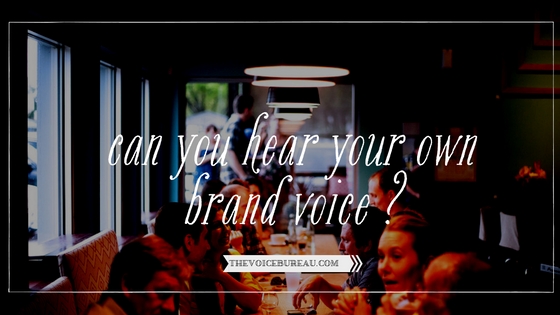About this column
Your Right Person is listening. Learning to use your Voice Values ensures you’re speaking the same language. Create. Connect. Converse. (Convert.)
When I was in college, I discovered that I have an accent.
I grew up in central Pennsylvania, in a suburb of Harrisburg called Linglestown. Now, I definitely knew people who had accents. Locals, even. People who threw around “yinz” (think “y’all” for the northern set) and “crick” (the stream of water behind our house). Even a few bonafide Pennsylvania Dutch folks, with all those weird turns of phrase. But me? Flat mid-Atlantic affect. Perfect voice for radio. (I’ve done a few commercials. NBD.) Or so I thought, anyway.
Fast-forward 18 years. Scene: a small but diverse liberal arts college in Southern California. I’m thrown in the mix with bright-eyed students from around the world. I’ve got friends with all manner of very obvious accents…and out of nowhere, I’m informed that I have a funny way of saying things. An elongated “o” in the middle of words. A lilt at the end of my sentences when they go on a little too long that makes it sound like I’m asking a question when I’m making a statement.
You’d think this would have come up sooner.
So now I’m suddenly self-conscious. I avoid saying things like…that company that makes PhotoShop. I clip my thoughts. Period. End of statement.
A year after graduation, I moved to Florida, my vocabulary packed with new lingo that immediately pegged me as an out-of-towner. Not so rad. Now, with multi-year stints in three of the four corners of the continental U.S., I’m a verbal mutt, with slang and speech patterns from all over. I’ll never fit in anywhere, accent-wise. But I’m okay with that now.
I wrote recently about how hard it can be to see our own special talents, the things that can make us uniquely useful. Our voice works the same way.
It’s tough to notice the idiosyncrasies of our personal speech patterns. But when we try on a voice that isn’t our own, there’s nothing more uncomfortable. Have you ever tried to fit in with a group by injecting some of their vernacular in your speech? It’s super awkward. You might even try to psych yourself up to say something but end up tongue-tied, totally unable to force the foreign words past your lips.
So why do so many online businesses sound like carbon copies of each other?
When a business is successful, it’s tempting to copy everything they do. Their look. Their style. Their business model. But what works for one business doesn’t work for everyone. And, even more importantly, copying what works for someone else means wearing a skin that doesn’t quite fit. Do you really want to speak in someone else’s voice all the time? Your business is your passion. Shouldn’t you be yourself?
There may not be too many people out there with a Pennsylvania-California-Florida accent. But it’s who I am, and when I use my own voice, my authenticity comes across. And, in business, when I relax into my Voice Values — rather than trying to be an audacious goddess or a love-led group-builder — I’m offering my best self, and the people who need me will know me. When I try to sound how I think people want me to sound, I get panicked. It’s untenable for me to pretend I’m someone I’m not, to wear the voice of a business that isn’t tailored to my own personality. What works for someone else just isn’t me.
And that’s okay.
Whether your Voice Values attract your Right Person because they see you as a kindred spirit or because you offer something they need but don’t have, knowing what’s important to you can be the first step in really hearing yourself. And, once you hear yourself — you learn your own accent, your own idiosyncrasies, the language that speaks to you and through you — you can really own it, and people will sit up and listen. It’s fine to try on an accent from time to time (who hasn’t gone a bit British after a Doctor Who marathon?), but speaking in your own, true voice? Well…
Yinz should give it a try. It’s pretty rad.
In the comments, I’d love to hear:
Have you ever tried to sound like someone else in your business? How did it feel? How does your voice show up in your work?

 Hello, you.
Hello, you.
{ 4 comments… read them below or add one }
Interesting. I’m a Brit living in America and I’ve found it difficult to retain my true voice. If I show up with all my innate British sarcasm, that just alienates my American audience. Also, you spell words differently and some words have completely meanings from British English. I struggle with this.
I completely understand this struggle, Jacqueline! I’ve (and we’ve) worked with quite a few Brits as clients, and it’s true what they say about us being “two countries separated by a common language.” I was raised on Danger Mouse, so I got a dose of that British sarcasm early and learned to love it, but I imagine it must be isolating to feel that you’re not quite connecting the way you’re used to.
Thanks for sharing this – I was really happy to receive an e-newsletter update from you today. An encouraging read and I do relate. I’ve lived in 5 countries, my husband and I have different cultural backgrounds and accents, I have a more emotional temperament, but at work my default mode is brief and corporate. My husband pointed this out to me recently and I have been taking a few risks with being more ‘me’ in my work correspondence. It does feel better. :-)
Over the years I’ve certainly struggled with my voice, often feeling like I had a fragmented voice that was better off dissolved than misunderstood. A little while ago I took some singing lessons, and was shocked by the sound of my own voice amplified. I made myself listen to the recordings till I could hear it without grimacing. I am still learning how to be me, and consequentially how to speak in my own voice; I guess it’s a process that can’t be hurried.
Thanks for sharing, Mel! I struggle with my email tone, too — I’m much warmer in person, but enough years in a corporate environment make that brisk email tone second nature. I try to remember that I *want* to connect with people, but when I’m pressed for time, I definitely catch myself defaulting to just the facts (ma’am). I’m a work in progress.
And I CANNOT understand how my recorded voice could possibly be me — I sound nothing like myself!